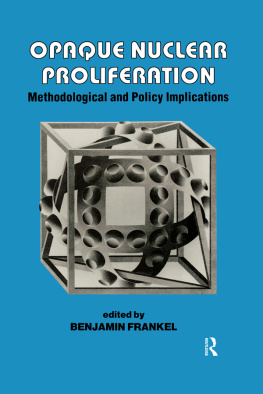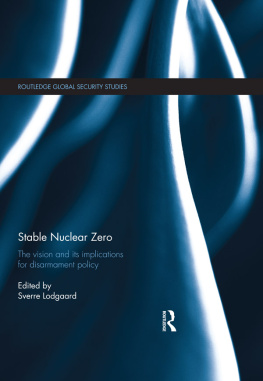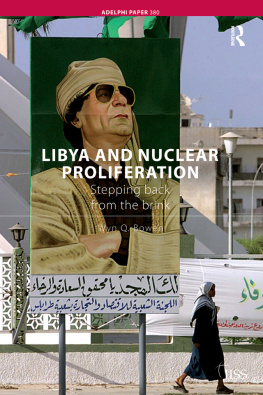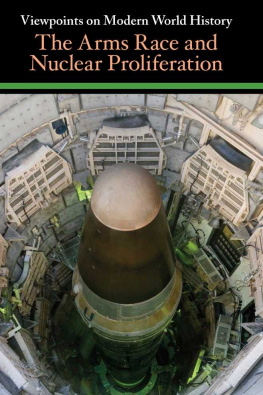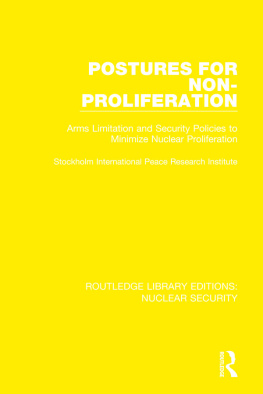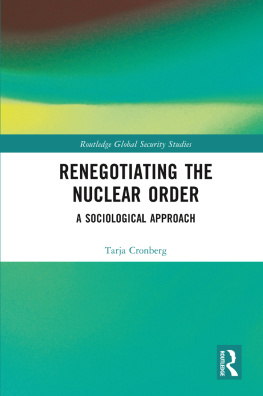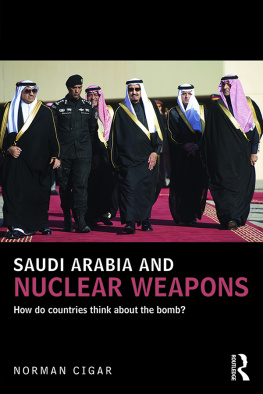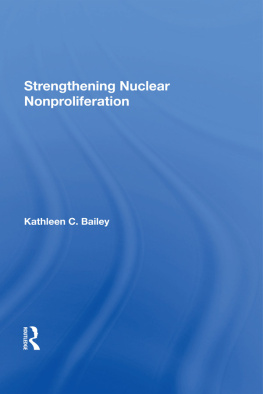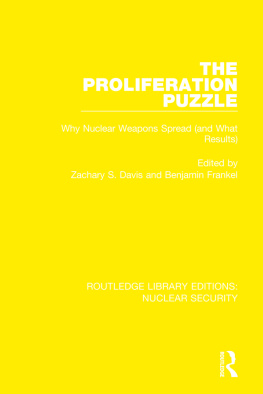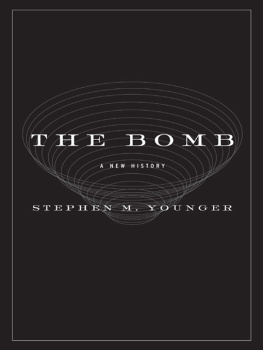Opaque Nuclear Proliferation: Methodological and Policy Implications
First published 1991 by
FRANK CASS AND COMPANY LIMITED
Published 2013 by Routledge
and in the United States of America by
Routledge
2 Park Square, Milton Park, Abingdon, Oxon OX14 4RN
711 Third Avenue, New York, NY 10017
Routledge is an imprint of the Taylor & Francis Group, an informa business
Copyright 1991 Frank Cass & Co. Ltd.
British Library Cataloguing in Publication Data
Opaque nuclear proliferation : methodological and policy
implications.
1. Nuclear weapons. Proliferation
I. Frankel, Benjamin 1949
355.825119
ISBN 978-0-714-63418-0 (hbk)
This group of studies first appeared in a Special Issue on Opaque Nuclear Proliferation: Methodological and Policy Implications of The Journal of Strategic Studies, Vol. 13, No. 3 published by Frank Cass & Co. Ltd.
All rights reserved. No part of this publication may be reproduced, stored in a retrieval system, or transmitted in any form, or by any means, electronic, mechanical, photocopying, recording, or otherwise, without the prior permission of the publisher.
Contents
Benjamin Frankel
Avner Cohen and Benjamin Frankel
Yair Evron
Avner Cohen and Marvin Miller
Neil Joeck
Roger K. Smith
Randy J. Rydell
Eric H. Arnett
Theodore B. Taylor
Emanuel Adler
Guide
Notes on the Contributors
Benjamin Frankel is editor of Security Studies. He is completing a manuscript on Henry Kissinger and US national security in the early 1970s, and is the editor of In the National Interest (1990); and the International Politics: 19451990 volumes of the Twentieth Century Encyclopedia (1991).
Avner Cohen is a lecturer in philosophy at Tel Aviv University. He is the author of The Nuclear Age: A Chapter in Moral History (in Hebrew; 1989) and co-editor of Nuclear Weapons and the Future of Humanity (1986) and The Institution of Philosophy (1989). He has written on skepticism, post-modernism, and the morality of deterrence.
Yair Evron is the chairman of the Department of Political Science at Tel Aviv University, where he teaches international relations. He is the author of Israels Nuclear Dilemma (1988); War and Intervention in Lebanon (1987); The Role of Arms Control in the Middle East (1977); The Middle East: Nations, Superpowers and War (1973); and the editor of International Violence: Terrorism, Surprise and Control (1979).
Marvin Miller is a senior research scientist with the Department of Nuclear Engineering and the Center for International Studies at the Massachusetts Institute of Technology. From 1984 to 1986 he was a Foster Fellow with the Nuclear Weapons and Control Bureau of the US Arms Control and Disarmament Agency, and is currently a member of a group of Soviet and American scientists working jointly on global security issues. His major research interests include arms control, especially nuclear proliferaion in the Middle East and South Asia and international safeguards and export controls for sensitive nuclear technologies, and the environmental impacts of energy use. He is the author of Heavy Water and Nonproliferation The Nuclear Dilemma: Power, Proliferation, and Development; and Global Energy Futures and CO2 Qimate Change.
Neil Joeck is an international political analyst in the special project division of the University of California Lawrence Livermore National Laboratory and is a research fellow of the University of California at Los Angeles Center for International and Strategic Affairs. He holds a Ph.D. from the University of California at Los Angeles and has taught at UCLA and the Chinese Academy of Social Science in Beijing. He is the editor of Arms Control and International Security (1984) and Strategic Consequences of Nuclear Proliferation in South Asia (1986).
Roger K. Smith is currently a post-doctoral research fellow at the Center for International Affairs, Harvard University, and Executive Director of the Aspen Strategy Group. His previous articles have appeared in International Organization and Millennium: Journal of International Studies.
Randy J. Rydell is a professional staff member of the Committee on Governmental Affairs of the United States Senate. From 1980 to 1986 he worked as a political analyst on nuclear non-proliferation issues at the Lawrence Livermore National Laboratory.
Eric H. Arnett is a program associate with the Program on Science, Arms Control, and National Security of the American Association for the Advancement of Science. He completed the work for this study at Carnegie Mellon Universitys Program on International Peace and Security. He is the author of Gunboat Diplomacy and the Bomb: Nuclear Proliferation and the U.S. Navy (1989), and Sea-Launched Cruise Missiles and U.S. Security (forthcoming).
Theodore B. Taylor , an independent consulting physicist, is president and chairman of NOVA, Inc., a renewable energy company. He has served as deputy director (scientific) of the Defense Atomic Support Agency (now the Defense Nuclear Agency) (196466); senior research adviser to the General Atomic Division of General Dynamics (195664); and staff member of the theoretical division at Los Alamos Scientific Laboratory (194956). He is the co-author of Nuclear Proliferation (1977); Nuclear Theft: Risks and Safeguards (1974); and The Restoration of the Earth (1973). His articles have appeared in Scientific America, Bulletin of the Atomic Scientists, FA.S. Public Interest Report , and other publications.
Emanuel Adler , is a senior lecturer in international relations at the Hebrew University of Jerusalem. He is the author of The Power of Ideology: The Quest for Technological Autonomy in Argentina and Brazil (1987) and co-editor of a forthcoming volume of essays on progress in international relations.
Benjamin Frankel
The articles collected in this volume were written in the summer of 1989. But publishing them now, a year later, is even more appropriate than when they were first written. 1989 was the last year of a decade during which the fear that nuclear arms might spread rapidly to numerous new states a major concern of policy makers in the 1970s appeared to subside. 1990 is the first year of a decade during which, it is already clear, the dangers from the continuing spread of nuclear arms have greatly intensified, creating the need for a new sense of urgency in addressing this issue. In his aptly titled Nuclear Proliferation in the 1990s: The Storm after the Lull, from which the quotes are taken, Leonard Spector writes that Stated simply, the multi-front proliferation dangers of the 1970s are returning. Rather than being published at the end of a period characterized by calm, these studies are offered at a time when the gathering storm has already been observed and noticed. The articles presented here are a contribution to the process of identification and clarification of what is to come.
The purpose of this collection is to urge scholars and practitioners to examine the received wisdom about nuclear weapons proliferation. Too many students of the subject accept unreflectively the presuppositions that have undergiided the proliferation debate in the last two decades. There are two sets of questions that need to be examined. This volume addresses the first set, dealing with what kind of a nuclear posture second generation nuclear weapons states adopt in a world in which the presumption of non-proliferation is generally accepted. We find that posture best described by the term opaque.

